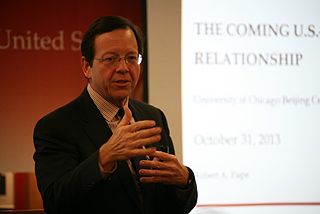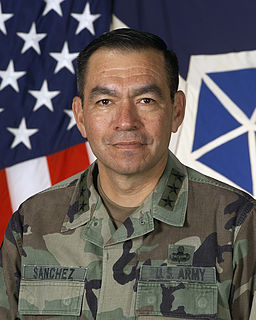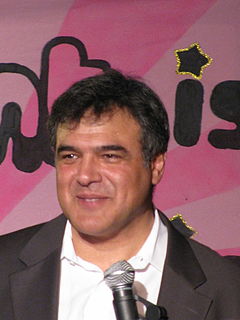A Quote by Robert Pape
What nearly all suicide terrorist attacks have in common is a specific secular and strategic goal: to compel modern democracies to withdraw military forces from territory that the terrorists consider to be their homeland.
Related Quotes
In the aftermath of the terrorist attacks of September 11, 2001, I watched helplessly as the Bush administration led America into a strategic blunder of historic proportions. It became painfully obvious that the executive branch of our government did not trust its military. It relied instead on a neoconservative ideology developed by men and women with little, if any, military experience. Some senior military leaders did not challenge civilian decision makers at the appropriate times, and the courageous few who did take a stand were subsequently forced out of the service.
Our adversaries - terrorists, foreign intelligence services, and criminals - take advantage of modern technology to hide their communications; recruit followers; and plan, conduct, and encourage espionage, cyber attacks, or terrorism to disperse information on different methods to attack the U.S. homeland and to facilitate other illegal activities.
In full accordance with the law - and in order to prevent terrorist attacks on the United States and to save American lives - the United States government conducts targeted strikes against specific al-Qa'ida terrorists, sometimes using remotely piloted aircraft, often referred to publicly as drones.
Well, my message is, is that if you harbor a terrorist, you're a terrorist. If you feed a terrorist, you're a terrorist. If you develop weapons of mass destruction that you want to terrorize the world, you'll be held accountable. . . . If anybody harbors a terrorist, they're a terrorist. If they fund a terrorist, they're a terrorist. If they house terrorists, they're terrorists. I mean, I can't make it any more clearly to other nations around the world. If they develop weapons of mass destruction that will be used to terrorize nations, they will be held accountable.
Take a look at the Supreme Court decision that just authorized an effort by U.S. claimants against Iran for terrorist acts. What are the terrorist acts? The terrorist acts are bombings of U.S. military installations in Lebanon and Saudi Arabia, which Iran is claimed to have something to do with. Well suppose they did. That's not terrorism. I mean if we have a military base in Lebanon that while we're shelling Lebanese naval ships, the Navy is shelling Lebanese installations and somebody attacks [that's not terrorism].
We need to employ a secular approach to ethics, secular in the Indian sense of respecting all religious traditions and even the views of non-believers in an unbiased way. Secular ethics rooted in scientific findings, common experience and common sense can easily be introduced into the secular education system. If we can do that there is a real prospect of making this 21st century an era of peace and compassion.
Why do terrorist attacks that kill a handful of Europeans command infinitely more American attention than do terrorist attacks that kill far larger numbers of Arabs? A terrorist attack that kills citizens of France or Belgium elicits from the United States heartfelt expressions of sympathy and solidarity. A terrorist attack that kills Egyptians or Iraqis elicits shrugs. Why the difference? To what extent does race provide the answer to that question?



































